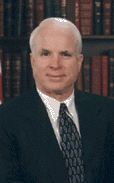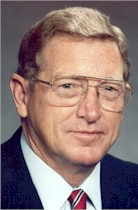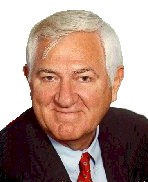
McCain
Online Privacy Bill Runs Aground
(July 27, 1999) The Senate Telecom Subcommittee held a hearing on legislation to protect online privacy on Tuesday, July 27. Sen. Burns and Sen. Wyden are cosponsoring S 809, the Online Privacy Protection Act. Earlier this month the FTC issued a report opposing any new legislation at this time.
| See, Summary of Online Privacy Bills in the 106th Congress. |
Since Sen. Conrad Burns (R-MT) and Sen. Ron Wyden (D-OR) introduced S 809 IS on April 15, its prospects for passage have only faded. The main problem is that the Federal Trade Commission just released a report that states that because of progress being made in industry self-regulation, legislation is not needed at this time.
| Related Story: FTC Opposes Online Privacy Legislation, 7/13/99. |
The July 13 report, "Self Regulation and Privacy Online," concluded that "self-regulation is the least intrusive and most efficient means to ensure fair information practices online, given the rapidly evolving nature of the Internet and computer technology." This conclusion was supported by FTC Chairman Robert Pitofsky, and two of the three other Commissioners. The FTC is the agency that would be given enforcement authority under S 809.
However, there are also other obstacles to passage. The bill is opposed by Sen. John McCain (R-AZ), the Chairman of the Commerce Committee. He did not attend the hearing, but issued a statement afterwards. He said "Clearly, consumer confidence in privacy matters is crucial to the success of the Internet as a tool of commerce."
 |
|
| Sen. John McCain |
"While I agree with the majority of the Commission that legislation to address online privacy is not appropriate at this time, the industry should not be mislead into thinking that these results represent some type of pass on future legislation."
"The Internet changes daily, if not hourly. Any regulation imposed today may be ineffective in protecting consumers tomorrow. In fact, regulation could impede the development and deployment of new technology that my empower consumers to protect their own privacy."
Sen. Jay Rockefeller (D-WV) noted Sen. McCain's opposition, and hinted that this meant that the bill would not be approved by the Commerce Committee.
Moreover, the Commerce Department, and industry groups, such as the Online Privacy Alliance, remain opposed to legislation.
Also, Sen. John Kerry (D-MA) stated at the outset of the hearing that he opposes new legislation. He stated, "I think that self-regulation is the more important way to proceed at this time." He also stated, "I have reviewed the FTC report, and generally agree with most of the majority view."
Finally, Sen. Wyden stated that "the reason I want us to pass S 809 is that I think it would be a great mistake in this country to essentially sit idly by, and wait for an Exxon Valdez style invasion of privacy before action is taken." Sen. Ted Stevens (R-AK), who is a senior member of the Commerce Committee, walked out of the hearing almost immediately after Sen. Wyden made this statement.
Later, after several of the FTC Commissioners who oppose S 809 said polite things about the bill, Sen. Wyden to remarked, "maybe we should quit while we are ahead."
Sen. Wyden at times sounded defensive. "I am not some wild eyed fanatic for regulating the Internet," he said during an exchange with Robert Pitofsky. "I believe in the power of the free market," he said at another point. Several times he reminded others that he supports reducing regulation and taxation of the Internet. He cited his sponsorship of the Internet Tax Freedom Act, his support for encryption legislation, and his involvement in passing a Y2K litigation reform bill.
 |
|
| Sen. Burns |
Sen. Burns remained steadfast in his support for passing a bill. "I have to say I was very puzzled by the FTC's recent report to Congress on internet privacy," Sen. Burns said in his opening statement. "The report acknowledged that fewer than 10 percent of websites meet basic privacy protections, but called for no federal legislation to address this critical situation."
Sen. Burns was optimistic about passing legislation. "As the communications revolution alters every aspect of our personal and economic lives, now is no time for delay and inaction. I will continue to move forward with this critical bill to make sure that consumers can feel confident in the safety of their personal information in the digital age. I will work with Sen. Wyden and my colleagues on the Committee to ensure that this bill moves to markup and passage by the full Senate as quickly as possible."
Some Senators did not express either support for or opposition to online privacy legislation. Sen. Jay Rockefeller (D-WV) said that he is undecided. Sen. Byron Dorgan (D-ND) stated at the hearing that "I think that the legislation that has been developed is an interesting and a useful contribution to the debate."
Sen. Burns and Sen. Wyden do have some support. Sheila Anthony, who comes from Hope, Arkansas, is the one FTC Commissioner who supports passing online privacy legislation now. However, she did not endorse S 809, or any of the other bills which have been introduced so far in the 106th Congress. "I believe the time is right for Congress to enact legislation," she said. "These bills can serve as starting points."
In addition, Marc Rotenberg, from the Electronic Privacy Information Center, testified that "S 809 is a wonderful, wonderful proposal."
Finally, Sen. Richard Bryan (D-NV) may be supportive. He stated that "I think that there is a significant issue there, and that we may indeed have to resort to a legislative solution, if we are not able to reach an agreement pretty soon." Sen. Bryan sponsored the Children's Online Privacy Protection Act which became law last year. It requires web sites that collect information from children under 13 to obtain prior parental consent.
The Committee heard from two panels of witnesses. The first panel consisted of all four of the Commissioners of the Federal Trade Commission:
| See, PDF copies of the prepared testimony of Robert Pitofsky, Sheila Anthony, Deirdre Mulligan, Marc Rotenberg, Christine Varney, and Jill Lesser in the Commerce Committee web site. |
The second panel was compromised of witnesses from industry and interest groups.
Orson Swindle is the FTC Commissioner most opposed to online privacy legislation. He stated several times that web surfers always have the choice of clicking out of any website that collects information. He also addressed the complexity of enforcing a law affecting so many businesses.
 |
|
| Orson Swindle |
"However, for those who wish to regulate online privacy, I ask, 'how will we do it?' The devil is in the details," Swindle said in his opening statement. "Recent data suggests there are now approximately 3.6 million commercial Web Sites, and they are increasing at over 275,000 a month."
"The old adage of 'looking before we leap' is still wise advice. Imposing additional laws and regulations on that which we do not yet fully understand could produce incredibly negative unintended consequences."
"Imagine this scenario: First of all, massive numbers of unintended or innocent violations of the new law will likely occur. Commercial Web sites are increasing at almost 10% a month. The overwhelming majority of these violations would be by entrepreneurs seeking to market a product on the Internet without understanding the new requirements or not possessing the technology or the resources to comply. The regulators, armed with the new law, would, of course, have to enforce it. Imagine the scope of this task and the likely effects on entrepreneurs," said Swindle.
Commissioner Swindle, like Sen. McCain, is a former fighter pilot who spent years in North Vietnamese prisons.
The members of the subcommittee who participated in all or part of the
hearing included Richard Bryan (D-NV), Conrad Burns (R-MT), Byron Dorgan (D-ND),
Jay Rockefeller (D-WV), John Kerry (D-MA), Ted Stevens (R-AK), and Ron Wyden
(D-OR).
| Related Stories |
| Burns and Wyden Introduce Online Privacy Bill,
4/18/99. FTC Opposes Online Privacy Legislation, 7/13/99. House Subcommittee Holds Hearing on Online Privacy, 7/14/99. Reaction to FTC Report on Online Privacy, 7/16/99. |